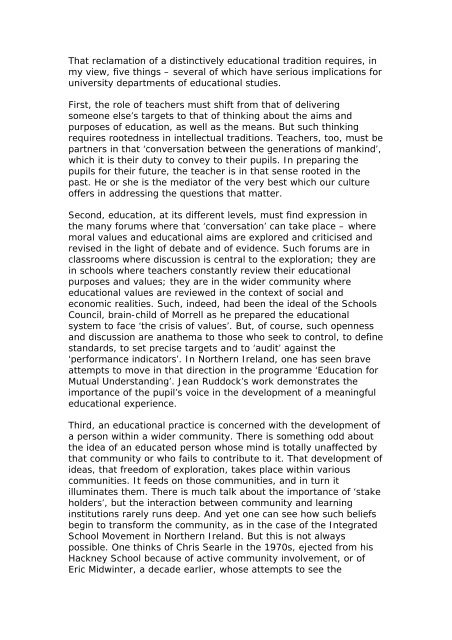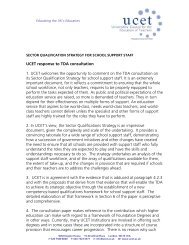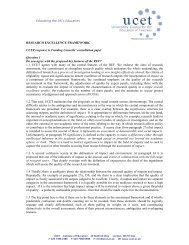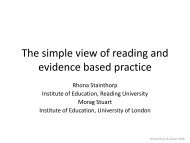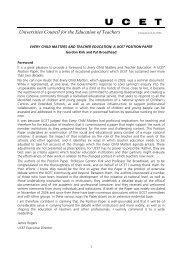The School Curriculum Ten Years Hence - UCET: Universities ...
The School Curriculum Ten Years Hence - UCET: Universities ...
The School Curriculum Ten Years Hence - UCET: Universities ...
Create successful ePaper yourself
Turn your PDF publications into a flip-book with our unique Google optimized e-Paper software.
That reclamation of a distinctively educational tradition requires, in<br />
my view, five things – several of which have serious implications for<br />
university departments of educational studies.<br />
First, the role of teachers must shift from that of delivering<br />
someone else’s targets to that of thinking about the aims and<br />
purposes of education, as well as the means. But such thinking<br />
requires rootedness in intellectual traditions. Teachers, too, must be<br />
partners in that ‘conversation between the generations of mankind’,<br />
which it is their duty to convey to their pupils. In preparing the<br />
pupils for their future, the teacher is in that sense rooted in the<br />
past. He or she is the mediator of the very best which our culture<br />
offers in addressing the questions that matter.<br />
Second, education, at its different levels, must find expression in<br />
the many forums where that ‘conversation’ can take place – where<br />
moral values and educational aims are explored and criticised and<br />
revised in the light of debate and of evidence. Such forums are in<br />
classrooms where discussion is central to the exploration; they are<br />
in schools where teachers constantly review their educational<br />
purposes and values; they are in the wider community where<br />
educational values are reviewed in the context of social and<br />
economic realities. Such, indeed, had been the ideal of the <strong>School</strong>s<br />
Council, brain-child of Morrell as he prepared the educational<br />
system to face ‘the crisis of values’. But, of course, such openness<br />
and discussion are anathema to those who seek to control, to define<br />
standards, to set precise targets and to ‘audit’ against the<br />
‘performance indicators’. In Northern Ireland, one has seen brave<br />
attempts to move in that direction in the programme ‘Education for<br />
Mutual Understanding’. Jean Ruddock’s work demonstrates the<br />
importance of the pupil’s voice in the development of a meaningful<br />
educational experience.<br />
Third, an educational practice is concerned with the development of<br />
a person within a wider community. <strong>The</strong>re is something odd about<br />
the idea of an educated person whose mind is totally unaffected by<br />
that community or who fails to contribute to it. That development of<br />
ideas, that freedom of exploration, takes place within various<br />
communities. It feeds on those communities, and in turn it<br />
illuminates them. <strong>The</strong>re is much talk about the importance of ‘stake<br />
holders’, but the interaction between community and learning<br />
institutions rarely runs deep. And yet one can see how such beliefs<br />
begin to transform the community, as in the case of the Integrated<br />
<strong>School</strong> Movement in Northern Ireland. But this is not always<br />
possible. One thinks of Chris Searle in the 1970s, ejected from his<br />
Hackney <strong>School</strong> because of active community involvement, or of<br />
Eric Midwinter, a decade earlier, whose attempts to see the


